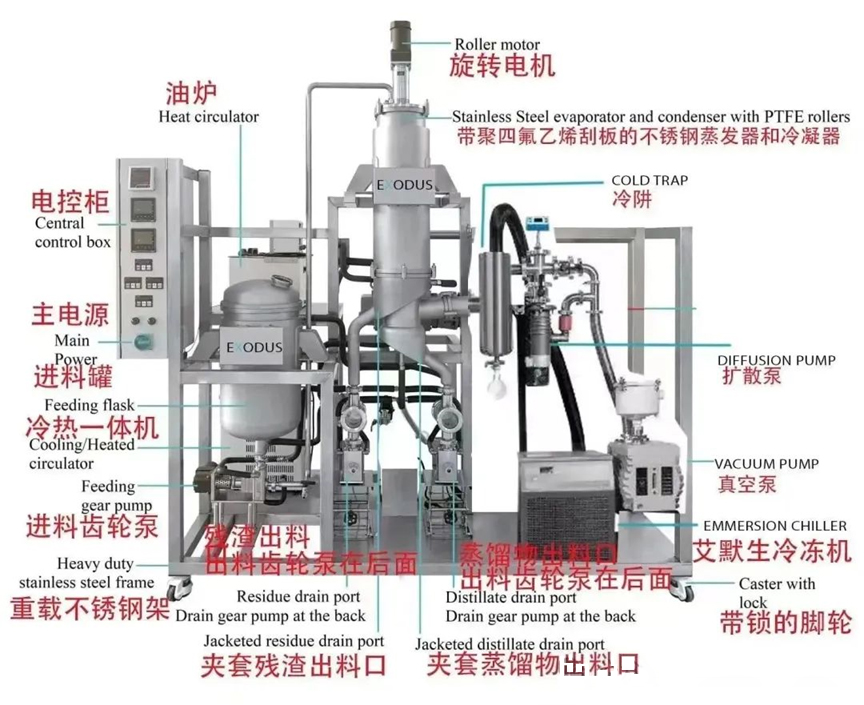
With the widespread application of molecular distillation technology, people's theoretical research on its process has become more and more in-depth. Although for many materials, there is still no mathematical model available for practical application to accurately describe the variable parameters in molecular distillation, in practice it should mainly rely on empirical summary. However, the evaporation conditions obtained from evaporators of various specifications can be safely extended to the design of production equipment.
Because it is carried out under high vacuum, its operating temperature can be much lower than the boiling point temperature of the material under normal pressure, and the time of the material is greatly shortened, avoiding the damage to the material itself caused by long-term heating. Based on the above advantages, molecular distillation is widely used to concentrate or purify high molecular weight, high boiling point, high viscosity substances and organic compounds with poor thermal stability. So far, molecular distillation technology has been successfully applied to petrochemical, food, cosmetics, pharmaceutical and other industries. This article mainly classifies the application of molecular distillation in the chemical industry.
1. Recovery of waste engine oil

The carbon produced by the incomplete combustion of the engine oil exists in the form of colloids and rough particles. Its presence will greatly damage the re-distillation and recovery process of the waste oil. The molecular distillation method can achieve a recovery rate of 72% for the engine oil, and can reduce the ash content in the waste oil from 0.83% to 0.00%, and the carbon content from 2.30% to 0.06%, which is not only efficient but also cost-effective.
2. Manufacture of high-viscosity lubricating oil
Silicone compounds are very good lubricating oils, which are often used in the manufacture of optical discs. They can improve the smoothness and stability of optical discs and extend their service life. Since siloxane compounds are heat-sensitive substances and their boiling points are all above 200°C, conventional distillation separation methods are easy to denature them. Molecular distillation can not only greatly reduce the content of color-forming substances in lubricating oils, but also reduce the time for distilling the same amount of siloxane by 40%.
3. Refining of aromatic oils
With the rapid development of daily chemical, light industry, pharmaceutical industry and other industries and foreign trade, the demand for natural essential oils is increasing. The main components of aromatic oils are aldehydes, ketones, alcohols, and most of them are terpenes. These compounds have high boiling points and are heat-sensitive substances. In the traditional distillation process, due to the long heating time and high temperature, it is easy to cause molecular rearrangement, oxidation, hydrolysis and even polymerization reactions, which destroy the aromatic components. Using molecular distillation at different vacuum degrees, different components can be purified and colored impurities and odors can be removed, ensuring the quality and grade of aromatic oils. It can be used to refine rose essential oil, jasmine essential oil, patchouli oil, cinnamon oil, citronella oil, etc.
4. Application in the nuclear industry
In high-temperature nuclear reactors, separating extremely low concentrations of tritium (about 10-6) from lithium has always been an unsolvable problem in the use of lithium. Tebus et al. successfully separated tritium from lithium using molecular distillation and proved that molecular distillation is a safe and effective method. Some scholars have also used multi-stage molecular distiller for isotope separation and enrichment, and successfully enriched uranium 235 and uranium 2382.5. Application in the food industry: Molecular distillation technology can be used to separate mixed oils and fats, and monoglycerides with a purity of more than 90% can be obtained, such as stearic acid monoglyceride, lauric acid monoglyceride, propylene glycol monoglyceride, etc.; fatty acids and their derivatives can be extracted to produce dimerized fatty acids; natural products can be extracted from animals and plants, such as fish oil, rice bran oil, wheat germ oil, etc., and can be used to refine various oils and fats to obtain higher purity.
Lanzani et al. used molecular distillation technology to not only successfully remove cholesterol from animal fats to meet edible standards, but also did not destroy heat-sensitive substances such as triglycerides in fats that are beneficial to the human body.
5. Application in the pharmaceutical industry

Extract synthetic and natural vitamins A and E, prepare amino acids and glucose derivatives, etc., and can be used to refine products and improve their purity. Xu Songlin et al. used scraped film molecular distillation to study the separation conditions of natural vitamin E and determined the optimal process conditions, including feed rate, operating pressure, distillation temperature, stirring speed, etc., and successfully increased the natural vitamin E content in the raw material from 3% to 80%.
6. Removal of heavy metals
Guerbet alcohol, as a raw material, is widely used in industries such as cosmetics, pharmaceuticals, textiles and lubricants. In the process of synthesizing Guerbet alcohol, oxides of alkali metals, nickel, titanium and other substances are required as catalysts. Therefore, the crude product contains metal salts and metal saponification products. Some scholars used molecular distillation technology to treat the vinegar product of 1-hexanol catalytic reaction to produce 2-butyl octanol, and found that the yield of 2-butyl octanol was very high and completely free of alkali metals, heavy metals and metal saponification products.
7. Conclusion
Molecular distillation technology is a new, excellent, and simple distillation technology. As an effective means of separating high-boiling-point and heat-sensitive substances, it has attracted attention from countries around the world since its emergence. In terms of application, many products have been industrialized in foreign countries. Although the research on molecular distillation technology in my country started late, it has developed rapidly, and has produced and applied many varieties such as natural vitamins and linolenic acid. The product quality is at an advanced level compared with similar foreign products. It is believed that in the future, the application of molecular distillation technology will become more and more extensive and large-scale and industrialized, and it will occupy an important position in chemical production.